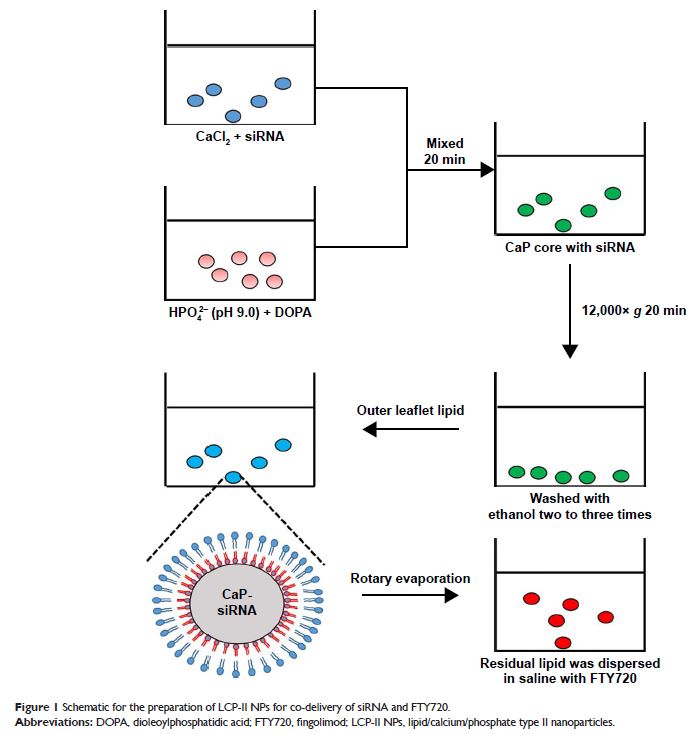108985
论文已发表
注册即可获取德孚的最新动态
IF 收录期刊
- 3.4 Breast Cancer (Dove Med Press)
- 3.2 Clin Epidemiol
- 2.6 Cancer Manag Res
- 2.9 Infect Drug Resist
- 3.7 Clin Interv Aging
- 5.1 Drug Des Dev Ther
- 3.1 Int J Chronic Obstr
- 6.6 Int J Nanomed
- 2.6 Int J Women's Health
- 2.9 Neuropsych Dis Treat
- 2.8 OncoTargets Ther
- 2.0 Patient Prefer Adher
- 2.2 Ther Clin Risk Manag
- 2.5 J Pain Res
- 3.0 Diabet Metab Synd Ob
- 3.2 Psychol Res Behav Ma
- 3.4 Nat Sci Sleep
- 1.8 Pharmgenomics Pers Med
- 2.0 Risk Manag Healthc Policy
- 4.1 J Inflamm Res
- 2.0 Int J Gen Med
- 3.4 J Hepatocell Carcinoma
- 3.0 J Asthma Allergy
- 2.2 Clin Cosmet Investig Dermatol
- 2.4 J Multidiscip Healthc

通过磷酸钙纳米颗粒将 Beclin 1 siRNA 和 FTY720 靶向共同递送至肝细胞癌以增强抗癌功效
Authors Wu JY, Wang ZX, Zhang G, Lu X, Qiang GH, Hu W, Ji AL, Wu JH, Jiang CP
Received 7 November 2017
Accepted for publication 31 January 2018
Published 5 March 2018 Volume 2018:13 Pages 1265—1280
DOI https://doi.org/10.2147/IJN.S156328
Checked for plagiarism Yes
Review by Single-blind
Peer reviewers approved by Dr Govarthanan Muthusamy
Peer reviewer comments 2
Editor who approved publication: Dr Linlin Sun
Purpose: FTY720, known as fingolimod, is a new immunosuppressive agent with
effective anticancer properties. Although it was recently confirmed that FTY720
inhibits cancer cell proliferation, FTY720 can also induce protective autophagy
and reduce cytotoxicity. Blocking autophagy with Beclin 1 siRNA after treatment
with FTY720 promotes apoptosis. The objective of this study was to enhance the
anticancer effect of FTY720 in hepatocellular carcinoma (HCC) by targeted
co-delivery of FTY720 and Beclin 1 siRNA using calcium phosphate (CaP)
nanoparticles (NPs).
Materials and
methods: First, the siRNA was
encapsulated within the CaP core. To form an asymmetric lipid bilayer
structure, we then used an anionic lipid for the inner leaflet and a cationic
lipid for the outer leaflet; after removing chloroform by rotary evaporation,
these lipids were dispersed in a saline solution with FTY720. The NPs were
analyzed by transmission electron microscopy, dynamic light scattering and
ultraviolet–visible spectrophotometry. Cancer cell viability and cell death
were analyzed by MTT assays, fluorescence-activated cell sorting analysis and
Western blotting. In addition, the in vivo effects of the NPs were investigated
using an athymic nude mouse subcutaneous transplantation tumor model.
Results: When the CaP NPs, called LCP-II NPs, were loaded with FTY720 and siRNA,
they exhibited the expected size and were internalized by cells. These NPs were
stable in systemic circulation. Furthermore, co-delivery of FTY720 and Beclin 1
siRNA significantly increased cytotoxicity in vitro and in vivo compared with
that caused by treatment with the free drug alone.
Conclusion: The CaP NP system can be further developed for co-delivery of FTY720 and
Beclin 1 siRNA to treat HCC, enhancing the anticancer efficacy of FTY720. Our
findings provide a new insight into HCC treatment with co-delivered small
molecules and siRNA, and these results can be readily translated into cancer
clinical trials.
Keywords: LCP-II NPs, autophagy, FTY720, Beclin 1, co-delivery
